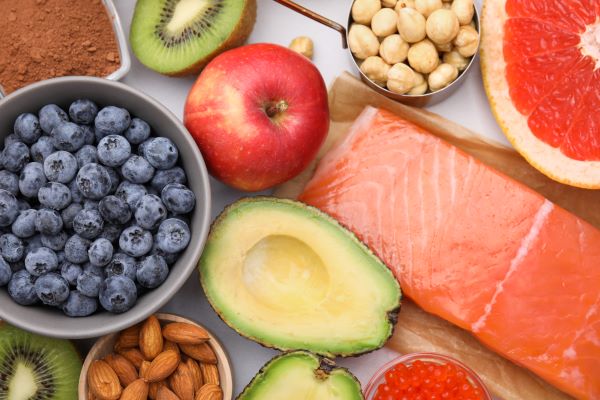Food Connects Us: Celebrating National Nutrition Month
March 10, 2025
Categories: Health & Wellness
Tags: Lifestyle Medicine
March is National Nutrition Month®, a time to reflect on how food shapes our lives, our health, and our communities. Established in 1973 by the Academy of Nutrition and Dietetics, this annual campaign encourages everyone to make informed food choices and develop healthy eating and physical activity habits. This year’s theme, "Food Connects Us," highlights the powerful role that food plays in bringing people together and influencing our well-being.
The Power of Food in Connection
Food is more than just fuel for our bodies. It connects us to our families, our cultures, and our traditions. Gathering around the table is an opportunity to share stories, celebrate milestones, and pass down cherished recipes. It also provides an avenue for learning—where our food comes from, who prepares it, and the methods used in its preparation.
Sharing meals nourishes social bonds and strengthens relationships. Research suggests that eating together as a family can improve communication, encourage healthier eating habits, and provide emotional support. This can show up in our emotional connection to the food itself. In many cultures, food is central to celebrations, ceremonies and rituals, symbolizing unity, gratitude, and heritage. Whether it’s a holiday feast, a simple dinner with loved ones, or a community potluck, food has the unique ability to bring people together across generations and backgrounds.
In addition to personal connections, food also unites us with the environment and the broader food system. When possible, supporting local farmers, choosing sustainably sourced ingredients, and reducing food waste are all ways that our food choices positively impact the world around us. By being mindful of where our food comes from and how it is prepared, we can foster a deeper appreciation for the journey from farm to table and build a more sustainable future.
Food and Health: An Interwoven Relationship
While our traditions and experiences influence what we eat, the foods we choose also impact our health. A well-balanced diet rich in whole, minimally processed foods can reduce the risk of chronic diseases such as heart disease, diabetes, and many cancers. Nutrient-dense foods support brain function, digestion, and overall energy, health, and strength. On the other hand, diets high in processed foods, added sugars, and unhealthy fats can increase the risk of chronic diseases and harm our well-being.
The Role of RDNs and NDTRs in Nutrition Education
Registered Dietitian Nutritionists (RDNs) and Nutrition and Dietetics Technicians, Registered (NDTRs) play a crucial role in bridging the gap between food and health. They provide evidence-based guidance on nutrition, helping individuals and communities make informed choices that support lifelong well-being. Whether working in hospitals, community programs, schools, or corporate wellness settings, these professionals empower people to make sustainable lifestyle changes that align with their cultural preferences and health goals.
The Lifestyle Medicine Approach at Trinity Health
At Trinity Health, our Lifestyle Medicine team embraces the theme of "Food Connects Us" by promoting whole food, plant-forward nutrition as a foundation for health. Our approach recognizes that food is deeply personal and should be tailored to individual needs and traditions. Through nutrition counseling, culinary education, and community programs, we support patients in making meaningful changes that enhance both health and quality of life.
How You Can Participate in National Nutrition Month
-
Explore New Foods: Try a dish from a different culture or experiment with new ingredients.
-
Cook and Share Meals: Prepare meals with family or friends to strengthen relationships and build healthy habits.
-
Learn from an RDN: : Learn from an RDN: Seek out a registered dietitian for personalized nutrition advice. The Lifestyle Medicine team’s Foundations of Lifestyle Medicine series provides expert guidance on how nutrition and other lifestyle factors support your health. The next class series begins next month!
-
Support Local Food Systems: Purchase from farmers' markets or choose locally grown ingredients when possible.
-
Focus on Whole Foods: Incorporate more fruits, vegetables, whole grains, and plant-based proteins (beans, lentils, nuts, seeds) into your meals. If you’re looking for ways to build confidence in the kitchen and improve your familiarity with whole, plant-based ingredients, join our free virtual culinary class, Cooking with Plants.
-
Hungry for connection? Former Surgeon General Vivek Murthy offers "Recipes for Connection," a booklet of creative ideas for gathering over food.
Food connects us in ways that extend beyond the plate. It shapes our health, fosters community, and preserves traditions. This National Nutrition Month, let’s celebrate the ways food unites us while making choices that support our well-being and longevity.
For more resources or to connect with the Trinity Health Ann Arbor Lifestyle Medicine team, visit Trinity Health Lifestyle Medicine.
Trinity Health Lifestyle Medicine
Authors: Clisty Kinlin, MS, RDN, CDCES, DipACLM and Emily Haller, MS, RDN, DipACLM




